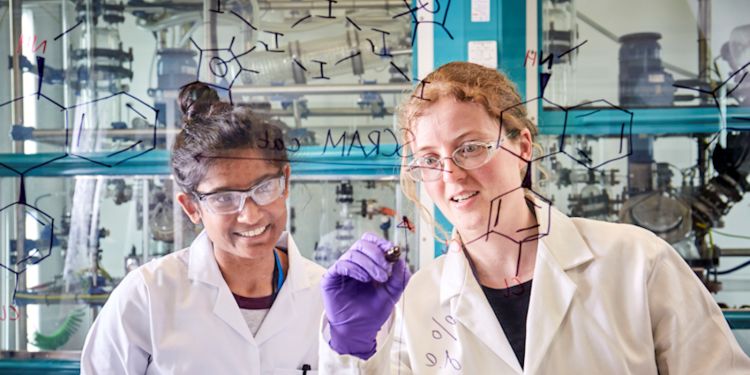Research highlights

Since REF 2014, the School completed its most significant programme of growth, specifically targeted towards sustaining our research base, recruiting and developing 25 tenure-track fellows in new areas of endeavour, and training 340 post-graduate research students. 20% of the publications we submitted to REF included a School Postgraduate research (PGR) student as the lead or co-author.
Our excellent REF results in REF 2021 reflect the outstanding contribution and commitment of all our academic staff, including our early career academics and researchers, research support and technical staff.
In the Research Excellence Framework (REF) 2021, 93% of the University of Leeds’s Geography research submitted was rated as either ‘world-leading’ or ‘internationally excellent’. This was due to us having:
Delivered impactful research
- Used location data to demonstrate the behaviour of UK residence during and after Covid-19 lockdowns shows 'diminishing returns' effect from repeated imposition of restrictions https://www.leeds.ac.uk/news-coronavirus/news/article/4971/assessing-household-mixing-during-the-pandemic
- Established and led a global forest observatory to assess rainforest carbon stores, which covers more than 30 countries with over 250 scientists and 50+ participating institutions. The research has influenced international climate change policy and efforts in countries across the tropics.
- Co-led a major study which unravelled what factors control tree mortality rates in Amazon forests and helps to explain why tree mortality is increasing across the Amazon basin. We also led a global analysis which revealed, for the first time, that across almost all tree species, fast-growing trees have shorter lifespans For the first time, we provided clear evidence that tropical tree lifespan decreases above a critical temperature threshold.
- Led an international study which found that intact rainforests across tropical Africa continued to remove carbon from the atmosphere before and during the 2015-2016 El Niño, despite the extreme heat and drought.
- Developed a pioneering model of affordable, community led housing in Leeds, which is inspiring community groups worldwide to build their own eco-homes.
- Highlighted the potential contribution of peatland restoration to cutting Green-House-Gas emissions in the UK. https://climate.leeds.ac.uk/news/managing-peatlands-to-cut-greenhouse-gas-emissions/
- Led an international research team which found that melting glaciers could be triggering a ‘feedback process’ that causes further climate change. We also led a study that revealed meltwater lakes that form at glacier margins cause ice to recede much further and faster compared to glaciers that terminate on land. Another study revealed that glaciers in the Southern Alps of New Zealand have lost more ice mass since pre-industrial times than remains today.
- Co-led an international study that predicted how future climate change could affect malaria transmission in Africa over the next century.
- Carried out one of the first studies to determine potential sources of microplastics pollution, which found water samples from UK rivers contained significantly higher concentrations of microplastics downstream from wastewater treatment plants.
Taken leadership roles in major collaborations
- Taken leadership of major research centres, including water@leeds, the Leeds Institute for Data Analytics, and forestplots.net, positioning us centrally in regional, national and international networks.
- Led the Urban Analytics research theme at the University and at the Alan Turing Institute.
- Grown the ForestPlots.net platform, which allows researchers worldwide to access tropical forest data, and contributed to the development of the global plant-traits database.
- Led the £6m Yorkshire Integrated Catchment Solutions Programme (iCASP), which is predicted to bring a £50 million benefit to the Yorkshire economy by reducing the costs and impact of water-related threats to the region.
- Led the Engineering and Physical Sciences Research Council (EPSRC) DecarboN8 network, which brings academics together with 23 industry, civil society and community partners, including Transport for the North, with an aim to decarbonise transport systems.
- Resumed advisory roles for policymakers and the Office for National Statistics (ONS), including as an expert advisor for National Population Projections and a panel member on Modernising the Census, and being part of the Population Theme Group committee.
- Formed a partnership between Leeds Institute for Data Analytics and Sainsbury’s to deliver data intensive research projects in nutrition and health, property and location analytics, and e-commerce.
- Collaborated with the Royal Botanic Gardens, Kew, to conduct research into the plants and fungi that could be used as a source of energy as well as assessing the species with the potential to be scaled-up with innovative technologies.
Grown our interdisciplinary research
- Addressed global challenges through strengthening our interdisciplinary research capability, combining staff expertise and mentoring for postgraduate researchers across numerous disciplines within the Environment and Engineering and Physical Sciences faculties.
- Achieved 456,492 downloads of research outputs, 97,601 downloads of theses; and 200,000 downloads of open-access outputs through the Consumer Data Research Centre (CDRC).
- Successfully grown EU funding, taking up five co-ordinator roles totalling £3.8m in the Euro-Flow, BESTMAP, Contested Territories, DUST and EMPOWER projects.
- Won partner roles in £20m EU projects, including CONSOLE, Contested cities, ECOPOTENTIAL, and RECARE.
- Achieved several large grant successes, including the Consumer Data Research Support Service (CDRSS), ELEVATE, Demand, DecarboN8, Sustainable microgrids, RAINFOR, and SIPHER.
Supported our staff and postgraduate researchers
- Developed new Black, Asian, and Minority Ethnic (BAME) and LGBTQ+ postgraduate initiatives, recognising equality and inclusion in structures and cultures are key to maintaining high quality research, impact and training.
- Received the Athena Swan silver award in recognition of our strong commitment to supporting women in STEM and addressing broader challenges faced by students and staff from under-represented groups.

